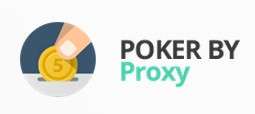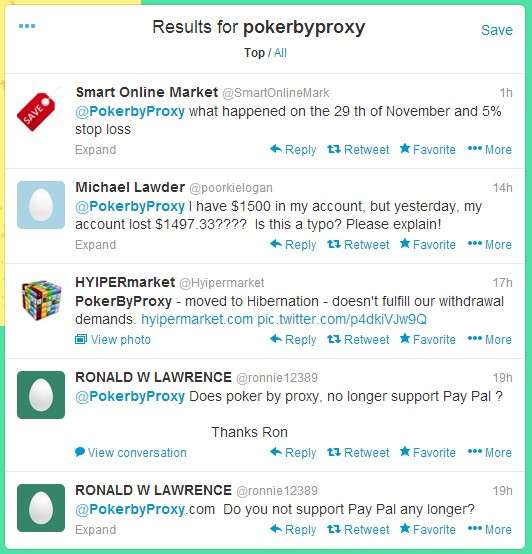Poker by Proxy a Likely Scam in Collapse Mode
 It’s been a while since a good old-fashioned scam connected with poker has surfaced, but they may be the case with an operation called Poker by Proxy, which appears to be collapsing even as this report is written… as all good Ponzi schemes are wont to do.
It’s been a while since a good old-fashioned scam connected with poker has surfaced, but they may be the case with an operation called Poker by Proxy, which appears to be collapsing even as this report is written… as all good Ponzi schemes are wont to do.
Poker by Proxy, according to its website, offers non-poker-players a chance to invest in the fortunes of an unspecified team of poker pros, who are guaranteed to thoroughly trounce the online competition. While at first glance this might look like a twist on a standard backing arrangement, the Poker by Proxy operation is far more squirrelly.
Because there’s a high probability that PbP will disappear into the ether soon, let’s preserve some of its marketing claims:
Poker by Proxy is a new way to make money like no other. Using the massive profit potential of online and offline poker, we enable you to earn consistent profits from poker, without ever taking the risk of playing for yourself. Whether you’re a poker pro, or even if you know ABSOLUTELY NOTHING about poker, you can make a fortune through Poker by Proxy. Using poker as a means to generate profit, Poker by Proxy provides investors with a surprisingly safe and powerful method to earn substantial returns on their investments. While traditional investments provide results that amount to a few percent per day, we often experience daily returns in excess of 5%, 10% or even 15%! These returns can jump even higher on exceptionally profitable days. Of course, there are occasional days where the Poker by Proxy team fails to produce a positive return, however this is mitigated by our 5% stop-loss rule. You can never lose more than 5% of your investment in a single day.
Poker by Proxy works by taking your money, and distributing it amongst our team of skilled poker players. Our players then use your funds, combined with the funds of every other Poker by Proxy member, to play in some of the most profitable online games, as well as large offline tournaments. Depending on the size of the pool, the number of games which we play, as well as the types of games will vary.
There’s so much fail in that its hard to know where to start, but this’ll do: “While traditional investments provide results that amount to a few percent per day, we often experience daily returns in excess of 5%, 10% or even 15%!” Actually, traditional investments yield only a tiny fraction of 1% return on a daily basis, and even high-risk, high-yield ventures probably wouldn’t spit out more than a couple of tenths a percent on a daily basis. That this venture’s claims are silly goes without much more elaboration.
Then, there’s the question of exactly who this “team of skilled poker players” is, but that information is nowhere to be found. (As we’ll soon see, it’s likely that no actual poker was being played; this was all about separating the gullible from their money.)
There’s also the hilarious stop-loss limit of 5% per day, a borrowing of a concept from certain financial-investment sectors that has little to do with poker. A variant of that is practiced by some pros who practice bankroll management, but that’s not PbP’s intent in implementing it here. Instead, when combined with the promised “5%, 10% or even 15%!” daily gains, it’s meant to imply a “can’t lose” guarantee to the concept, and to whet the appetite of any suckers who might fall for it.
It seems a few of those suckers did fall for it, and, in the nature of Ponzi schemes, which send some money back to the earliest investors in an attempt to lure more, some money was returned for a couple of months. That, though, appears to be over, following the posting of yesterday’s daily posting of the action and returns on investment: 99%. Yep, despite that supposed 5% stop-loss, the people behind Poker By Proxy claim that 99% of the money supposedly being played with on behalf of the site’s investors has gone up in smoke.
Some of those natives are restless, as can be seen in this screen-grab from Twitter:
By way of explanation for the unexplainable 99% loss, Poker by Proxy posted a long and rambling statement blaming, among other things, the “thieves at PayPal.” What that probably means is that someone reported that PayPal was being used by PbP as one of several funding avenues for the enterprise, and as soon as PayPal found out, they turned off the spigot. Given that numerous funding options were available, including Bitcoins, any annulled PayPal transactions could come nowhere close to explaining the 99%.
Also issued by PbP in the last 48 hours or so minor cashouts to a few small investors — payouts being such amounts as $1.43 and $2.10 — while major requests for significant cashouts go unfulfilled. Even less surprising are promises of refunds posted by a PbP spokesperson on moneymaker.com, a HYIP posting board where Poker By Proxy seems to have rounded up many of its victims… err, investors. Except those promises blame others (such as PayPal) and warn people that if they dare to complain or even ask for a cashout, they will “forfeit” their investment.
Sounds legal. Well, no, maybe not.
The complete statement is here, but let’s just share a couple of highlights. First, about those thieving PayPal processors, and others:
Payment Processors
The main problem is that the payment processors seem to be run by thieves. Paypal has now managed to steal the vast majority of the funds that were deposited. Not only have they frozen accounts, they have billed our personal credit cards, bank accounts, and more. Paypal is one of the biggest scams I have ever seen, and somehow they manage to get away with it. To make matters worse, some idiotic investors have caused problems by starting disputes when their withdrawals weren’t paid instantly….
And, “The Plan”:
1) Anyone who threatens us or anyone associated with Poker by Proxy will voluntarily forfeit any funds that they have deposited with Poker by Proxy. We are tired of the ridiculous threats. We have actually received threats of violence when a user’s withdrawal took more than 2 hours. We have no interest in dealing with such idiots.
2) If you send any message requesting that your payment be expedited, your funds will be forfeited. Such messages simply waste everyone’s time.
3) The recovery process covers deposits, not overall account balances.
4) Withdrawals will now be paid within 72 hours. If you complain, as many of you have when your withdrawal was processed within a few hours, your account will be forfeited.
Continuing the pretense of legitimacy while actually turning of the major money spigots is another hallmark of a Ponzi operation which has run its course. A closer look inside makes it clear this is anything but a legitimate operation.
One such example comes from the supposed daily returns for the site’s playing fund, which appear to be cobbled up out of thin air. We mentioned the ridiculous rates as promised, above, and now here’s a continuous sample of supposed daily results, running from October 1st through November 28th:
2.70%
3.00%
-4.00%
1.50%
4.08%
3.33%
1.07%
-3.00%
3.20%
2.40%
2.10%
2.00%
1.03%
-3.21%
3.05%
2.16%
2.50%
1.03%
3.20%
-2.95%
2.80%
3.02%
1.06%
2.01%
1.15%
3.04%
3.20%
-2.90%
4.00%
2.40%
1.14%
2.03%
-2.45%
2.20%
2.40%
3.06%
1.17%
2.00%
-3.98%
2.07%
4.05%
1.25%
2.70%
1.30%
-2.90%
3.20%
1.77%
2.12%
2.40%
-3.90%
2.30%
2.10%
1.14%
3.00%
1.13%
2.09%
1.40%
2.10%
-4.60%
As one can see, the losing days (in red), are laughingly, predictably rythymic. Todd Witteles of Poker Fraud Alert was the first to point this out, but what’s also just a hoot are the actual numbers themselves. The stop loss figure of -5% was never implemented, but neither was 5% ever hit on the positive side.
Have you ever heard of a skilled player or a small team of skilled players who never once had a single day in which they had a big win that would have increased their bankroll by more than 5%? Despite the fact that the supposedly daily win rates are laughable and unsupportable, the fact that there’s not a single large win in all those days is every bit as much a fraud indicator, just another sign that the scheme was created to steal money from people who don’t know much about poker.
To make it even odder, the players and administrators have claimed in their fictitious daily updates that some of the pros were grinding away in small tournaments, and that makes that string of win rates utterly impossible. Even for excellent grinding tourney pros, the usual pattern is to have lots of little losing days punctuated by the occasional big score. Given that, a sample of daily return percentages really should have looked something like this:
-1.20%
-5.00%
17.13%
1.55%
-0.09%
-1.14%
-5.00%
That sort of pattern might just be believable, as it would be typical for a tourney grinder. Make no mistakes: Poker By Proxy’s claimed results are fraudulent, and unrelatable to any know grinder’s (or team of grinders’) performance expectations.
So who is behind Poker by Proxy? There’s someone named “Jack” and he’s the younger of two people with seeming British accents who pimped Poker By Proxy in three brief marketing videos put up on YouTube.
Then there’s Poker By Proxy’s Facebook page, which oddly enough hasn’t seen a new post since September 5th, even though it was started only weeks before that, on August 15th. However, an examination of posters communicating about PbP shows that a Facebook user called “DRsom Sheddy” has been acting as the administrator of the PbP Facebook site, including handling communications from wannabe investors. Sheddy also set up one of the first known Poker by Proxy affiliate accounts and repeatedly pimped the enterprise on Facebook and elsewhere.
But is “DRsom Sheddy” a real person? Whoever he is, he appears to be an India-based multi-level marketer. Here’s a look at ol’ Sheddy’s Facebook page:
DRsom Sheddy responded to the very first Facebook post ever sent to Poker By Proxy, and he’s done so ever since. Now, whoever DRsom Sheddy is, he is NOT the man pictured… and that screams scam as well. The man pictured is fairly easy to identify via Google Images, and turns out to be a prominent German business executive named Martin Goetzeler:
There’s plenty more, but the initial evidence is quite damning; this is a fraudulent operation that’s in the process of going under. Add in the lack of official contact information, the omission of who is doing the playing and where the playing is taking place, the hilarious daily reports that insist that Sunday is a quiet, off day at the tables, and it’s worth quite the chuckle.
But not a penny of your or anyone’s money.























COMMENTS